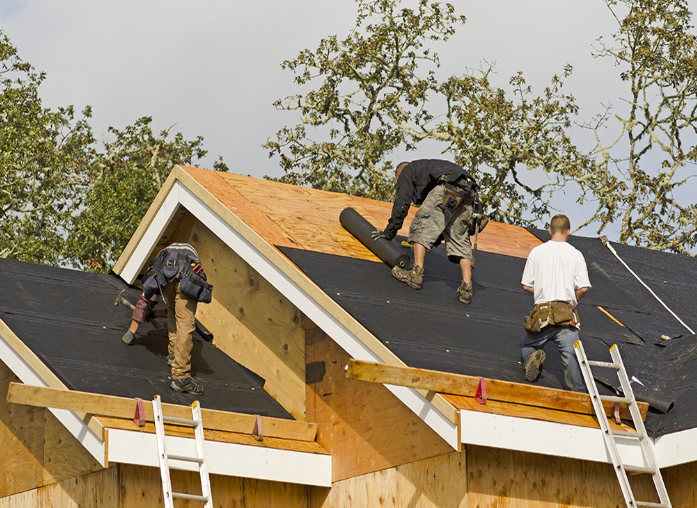Hiring the right roofing contractor can make or break your roofing project. Whether you’re installing a new roof, replacing an old one, or simply upgrading for energy efficiency, choosing a qualified and trustworthy roofer is critical. It’s not just about materials and labor—it’s about professionalism, communication, warranties, and long-term peace of mind.
At All Aspects Roofing, we know that homeowners want to feel confident in their investment. That’s why we’ve put together this comprehensive guide to the top questions you should ask before hiring a roof installation contractor. The answers to these questions can reveal a lot about a contractor’s reliability, workmanship, and customer service.
Let’s dive in.
1. Are You Licensed and Insured?
This is the first—and most important—question to ask. A legitimate roofing contractor should be licensed in your state and carry both general liability insurance and workers’ compensation.
- Why it matters: Licensing proves the contractor meets your state’s standards for professional work. Insurance protects you from financial responsibility if someone gets injured on your property or your home is damaged during the project.
- Pro Tip: Ask for a copy of the contractor’s license and insurance certificate. Reputable companies like All Aspects Roofing will gladly provide documentation.
2. How Long Have You Been in the Roofing Business?
Experience counts in roofing. The longer a contractor has been in the industry, the more likely they’ve seen (and solved) all types of roofing challenges.
- Why it matters: A company that’s been around for 10+ years is more likely to be stable, reliable, and knowledgeable.
- What to listen for: Contractors who highlight years of experience with a variety of roof types—shingles, metal, tile—are a safe bet. All Aspects Roofing, for example, brings years of hands-on expertise to every project.
3. Can You Provide Local References or a Portfolio of Past Projects?
Seeing is believing. Always ask for photos of past work and references from previous customers—especially those in your area.
- Why it matters: It’s the best way to evaluate the contractor’s craftsmanship and customer satisfaction.
- Tip: Contact at least two references and ask: Did the project finish on time? Was the crew respectful and tidy? Were there any surprises?
4. What Type of Roofing Materials Do You Recommend and Why?
The quality and type of materials play a major role in the performance and longevity of your roof. A knowledgeable contractor should help you choose the best option for your needs and climate.
- Why it matters: Not all roofing materials are created equal. Asphalt shingles, metal roofs, tile, and synthetic materials vary in durability, cost, and aesthetics.
- Look for: A contractor who takes time to explain material options, warranty details, and energy efficiency.
5. Do You Offer a Written Estimate and Contract?
Never accept verbal agreements. A professional contractor will provide a detailed written estimate and contract that outlines costs, timelines, materials, and warranties.
- Why it matters: It protects both parties from misunderstandings and surprises.
- What to include:
- Start and end dates
- Payment schedule
- Scope of work
- Materials and brands used
- Warranty terms
6. What Warranty Do You Provide on Labor and Materials?
Warranties are a sign that a contractor stands behind their work. There are typically two types: manufacturer’s warranty (on materials) and workmanship warranty (on installation).
- Why it matters: If your roof leaks or fails, a warranty ensures it’ll be repaired at no additional cost.
- All Aspects Roofing, for example, offers generous labor and material warranties, because we believe in long-term protection—not just short-term fixes.
7. Who Will Be Onsite During the Installation?
Clear communication about the crew working on your home is essential. Will the contractor be onsite every day, or will they send a subcontractor you’ve never met?
- Why it matters: Accountability. You want to know who to speak to if issues arise.
- Pro Tip: Ask if the crew is employed directly by the company or subcontracted. Companies like All Aspects Roofing use trained in-house teams, ensuring consistent quality.
8. What’s the Estimated Timeline for Completion?
While weather and unforeseen issues can cause delays, a professional contractor should give you a realistic time estimate.
- Why it matters: It helps you plan your schedule and sets clear expectations.
- Bonus tip: Ask what happens if the project goes over schedule—are there penalties or extra fees?
9. How Will You Protect My Property During the Job?
Roofing work can be messy. Ensure the contractor takes steps to protect your home, landscaping, driveway, and attic.
- Why it matters: You don’t want to end up with broken plants, punctured shingles, or leftover nails in your lawn.
- Good contractors will:
- Use tarps and plywood to cover landscaping
- Clean up daily
- Use magnetic nail sweepers after the job
10. How Do You Handle Weather Delays or Emergencies?
Mother Nature doesn’t always cooperate. Ask how the contractor handles rain, wind, or other weather delays.
- Why it matters: It shows whether the company has a contingency plan and how they prioritize safety.
- Look for: A clear answer that includes covering exposed roof sections and daily monitoring of weather forecasts.
11. What Is Your Payment Schedule?
Be cautious of contractors who ask for full payment upfront. A typical schedule may include a deposit, a progress payment, and a final payment upon completion.
- Why it matters: A fair payment plan protects you in case something goes wrong.
- Red flag: Demands for 100% upfront payment. All Aspects Roofing always follows transparent, staged payment terms.
12. Will You Obtain All Necessary Permits?
Most roofing projects require permits from local authorities. Your contractor should handle this as part of the job.
- Why it matters: If permits aren’t obtained, you may face fines or issues when selling your home.
- Ask directly: “Will you take care of the permits, or is that my responsibility?”
13. Do You Offer Roof Inspections or Maintenance Plans After Installation?
Great contractors don’t disappear after installation. Ask if they provide post-installation inspections or optional maintenance plans.
- Why it matters: Routine inspections can catch minor issues before they turn into expensive repairs.
- All Aspects Roofing offers follow-up services and inspections to ensure your roof lasts for decades.
14. How Do You Handle Unexpected Issues or Costs?
No one likes surprises—especially when it comes to money. Ask how the contractor handles hidden damage or unexpected changes in the scope of work.
- Why it matters: Transparent communication builds trust.
- Ask: “If you discover wood rot or structural issues, how will we handle it?”
15. Can You Explain the Cleanup Process After the Job?
The job isn’t over when the last shingle is nailed down. A good contractor leaves your property as clean as they found it—or cleaner.
- Why it matters: A messy job site can be dangerous and frustrating.
- Ask:
- Will nails and debris be removed?
- Will dumpsters be hauled away on the last day?
- Is cleanup included in the price?
Conclusion: Hire with Confidence
A roof installation is one of the biggest investments you’ll make in your home. Asking the right questions up front can save you money, stress, and headaches later. It’s not just about finding any roofing contractor—it’s about finding the right one.
At All Aspects Roofing, we believe in full transparency, top-quality workmanship, and customer-first service. Whether you’re building a new home or replacing an aging roof, our experienced team is ready to answer all your questions—before the first shingle is even installed.
FAQs
Q1: How do I know if I need a roof replacement or just repairs?
If your roof is over 15–20 years old, has visible damage (missing shingles, leaks), or you’re experiencing higher energy bills, a full replacement may be the better long-term solution. A professional inspection from All Aspects Roofing can help you decide.
Q2: How long does a typical roof installation take?
Most residential roof installations take 1–3 days, depending on the size and complexity of the job. Weather conditions can also affect the timeline.
Q3: What’s the best time of year to install a new roof?
Spring and fall offer the best conditions: moderate temperatures and fewer weather interruptions. However, All Aspects Roofing installs roofs year-round and can adapt to seasonal challenges.











Leave a Reply